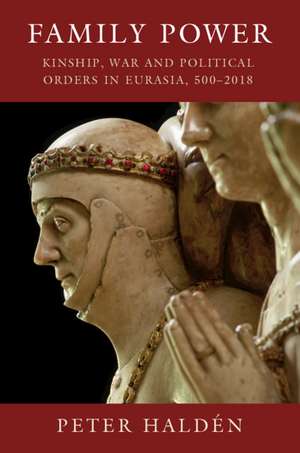Family Power: Kinship, War and Political Orders in Eurasia, 500–2018
Autor Peter Haldénen Limba Engleză Hardback – 18 mar 2020
Preț: 345.73 lei
Nou
Puncte Express: 519
Preț estimativ în valută:
66.16€ • 69.21$ • 54.96£
66.16€ • 69.21$ • 54.96£
Carte disponibilă
Livrare economică 12-26 martie
Preluare comenzi: 021 569.72.76
Specificații
ISBN-13: 9781108495929
ISBN-10: 1108495923
Pagini: 386
Dimensiuni: 159 x 235 x 26 mm
Greutate: 0.64 kg
Editura: Cambridge University Press
Colecția Cambridge University Press
Locul publicării:Cambridge, United Kingdom
ISBN-10: 1108495923
Pagini: 386
Dimensiuni: 159 x 235 x 26 mm
Greutate: 0.64 kg
Editura: Cambridge University Press
Colecția Cambridge University Press
Locul publicării:Cambridge, United Kingdom
Cuprins
1.Introduction; 2.How Social Science Separated Families from Political Order; 3.Formless Kinship in Formless Kingdoms. Europe c.500-c.1000; 4.Consolidating Dynasties and Realms. Europe c.1000-c.1500; 5.Strong Aristocracies in Strong States. Europe c.1500-c.1800; 6.The Revival and Sudden Death of Political Kinship. Europe c.1800-1918; 7.The Arab Empires 632-c.900; 8.Sacred Yet Supple. Kinship and Politics in Turkic-Mongol Empires c.900-c.1300; 9.The Ubiquitous and Opaque Elites of the Ottoman Empire c.1300-c.1830; 10.Clans and Dynasties in the Modern Middle East: Somalia and Saudi Arabia; 11.Conclusions: Implications For State Theory, Power and Modernity; Bibliography; Index.
Recenzii
In a time where Charles Tilly's bellicist explanation of state formation processes seems to dominate, Peter Haldén has made an important and outstanding contribution to the literature which partly argues that kinship was of major importance to the political order emerging in Europe and the Middle East and partly proves that not only coercion but also collaboration, negotiations and consent were essential aspects of the political orders. There is no doubt that this will become a seminal text in reintroducing the kinship as a key concept to understand the development of political orders and political institutions. It is really a work of clarity and depth which ought to set the agenda for the debates about European state formation processes. Lars Bo Kaspersen, Copenhagen Business School
In a pathbreaking study of extraordinary historical and comparative scope, Halden brings the family back into politics from the shadow world to which it has been relegated by modern social science. He shows just how central kinship groups are to the creation and success of political orders and develops a richer understanding of the state that decenter's Weber's emphasis on violence and bureaucracy. Richard Ned Lebow, King's College London
In a pathbreaking study of extraordinary historical and comparative scope, Halden brings the family back into politics from the shadow world to which it has been relegated by modern social science. He shows just how central kinship groups are to the creation and success of political orders and develops a richer understanding of the state that decenter's Weber's emphasis on violence and bureaucracy. Richard Ned Lebow, King's College London
Notă biografică
Descriere
Explains why successful states and empires have developed by fostering collaboration between families and dynasties, and the state.
